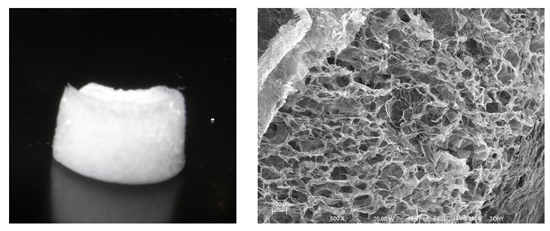Allograft Derived Scaffolds for Cartilage Repair
Despite the abundance of surgical treatment options, current standards of care for cartilage defects repair have many complications that limit long-term benefits. This has led to development of alternative tissue engineering approaches to enhance cartilage regeneration through combinations of cells (including stem cells) and three-dimensional biomaterial scaffolds. To date, however, stem cell-based tissue engineering remains far from clinical utility due in part to challenges associated with control of cell differentiation in vivo. Furthermore, man-made materials have a number of limitations that for the time-being limit their potential use for cartilage repair. To address these limitations, we recently developed novel porous scaffolds derived from freeze-dried cartilage allograft tissue and demonstrated that these scaffolds can be efficiently seeded with stromal mesenchymal stem cells (MSCs) for cartilage tissue engineering. The scaffolds have several empirical advantages over man-made biomaterials (synthetic or biological) the most important of which is their content of native growth factors (e.g. cartilage-derived morphogenetic proteins or CDMPs) and native extracellular matrix molecules that provide crucial signals to regulate the differentiation of the MSCs into functional hyaline cartilage.

Gross image of the cartilage-derived scaffold and a magnified SEM image showing the porosity of the scaffold.
Researcher: Hani A. Awad, Ph.D.
Musculoskeletal Tissue Engineering
